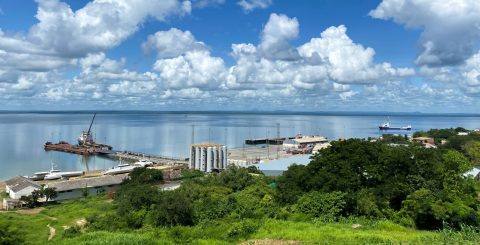
Tschudi prepares for more work in Mozambique’s Area 1 an Are 4 projects
Mozambique’s budding offshore oil and gas industry has prompted Tschudi Logistics to expand its presence in the country. While the Covid 19 pandemic and the unrests in the north of Mozambique delayed any advancement in the region, recent developments have opened the door to expansion with Tschudi pouncing with a new office in Pemba.
To remind, since opening its office in Maputo, Mozmbique in 2019, Tschudi Logistics faced the impacts of the Covid 19 restrictions, but also the violent disturbances in the northern part of the country. Militant attacks in the northern province of Cabo Delgado have sharply increased since 2017 onwards, however, with multinational energy companies looking to explore and monetise the vast offshore gas resources, the government has also increased its military presence in the region, stabilising the situation.
Prior to the opening of the Pemba office, Tschudi Logistics‘ office in Maputo has joggled many challenges succeeding in building a stable business against all odds.
“Difficult times seems to finally be waning. This has directly affected the large oil and gas projects in northern Mozambique and many of the big players have decided to pick up business after staying dormant for a couple of years. As a result of the budding business activities, Tschudi Mozambique is now officially announcing the opening of a new office in Pemba. The new office will get support from the Maputo-based team and the rest of Tschudi Logistics team during the start-up period,” the company said in its statement.
Key role in Area 1 and Area 4 development
Pemba plays a key role in the development of Area 1 and Area 4, as the city and port is the main hub for delivery of cargo for distribution across the northern part of Mozambique.
Area 1, located 40 KM off the coast of Mozambique, has around 75 trillion cubic feet (Tcf) of recoverable gas. The area includes the Golfinho-Atum field that will be the resource base for the 12.88 mmtpa of the Mozambique LNG export facility. The project is being developed by a consortium led by the french major Total, the operator Mozambique LNG with a 26.5 percent participating interest alongside ENH Rovuma Área Um (15 percent), Mitsui E&P Mozambique Area1 (20 percent), ONGC Videsh Rovuma (10 percent), Beas Rovuma Energy Mozambique (10 percent), BPRL Ventures Mozambique (10 percent), and PTTEP Mozambique Area 1 (8.5 percent).
The area was awarded to Eni and ENH in the second offshore licensing round, in the deep offshore in the northern part of the Cabo Delgado province, in the Rovuma sedimentary basin. Between 2011 and 2014, the company discovered supergiant natural gas resources in the Rovuma basin, in the Coral, Mamba Complex and Agulha reservoirs, holding estimated 2,400 billion cubic metres of gas in place. Eni also holds exploration rights to offshore blocks A5-B, Z5-C and Z5-D in the Angoche and Zambezi basins.
Area 4 is operated by Mozambique Rovuma Venture (MRV), an incorporated joint venture owned by Eni, ExxonMobil and CNPC, which holds a 70 percent interest in the Area 4 exploration and production concession contract. In addition to MRV, Galp, KOGAS and Empresa Nacional de Hidrocarbonetos E.P. each hold a 10 percent interest in Area 4.
The consortium aims to monetise the 450 billion cubic meters of gas from the giant Coral reservoir in the Area 4 with the Coral Sul FLNG, a floating production unit with a gas liquefaction capacity of 3.4 million tons per year (MTPA). The FLNG unit was built at the Samsung Heavy Industries yard in South Korea. The FLNG unit has arrived in Mozambique at the start of the year.
Pemba office allows Tschudi Logistics to scale up services
A physical office will enable on-site services in Pemba on a larger scale than currently. Up until now, the team in Maputo has travelled to Pemba when requested by clients – a demand which can now easily be met.
Just like the existing Tschudi Mozambique team in Maputo, the new team in Pemba will offer a broad variety of services within the logistics segment covering both on- and offshore related tasks. The team is experienced in providing logistics for aid and relief, renewable energy projects, oil and gas, and much more.
Fabio Spetrini is Head of the day-to-day running of the office and will be working closely with Thomas Vestergaard, managing director for Tschudi Mozambique. Spetrini has been granted the official title as general manager for the Pemba office.
“The office in Pemba is a result of our experiences in Maputo so far – being present in the north is an absolute necessity as it enables us to act promptly whilst being on site. I believe that it is from here we can provide the best possible services related to the activities connected to Area 1 and Area 4,” says managing director, Tschudi Mozambique Thomas Vestergaard.



